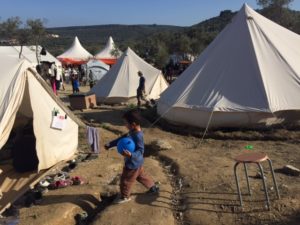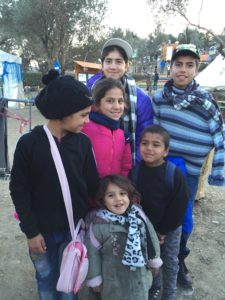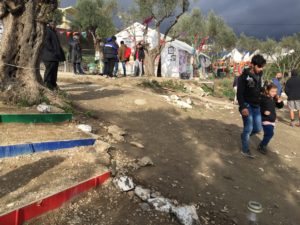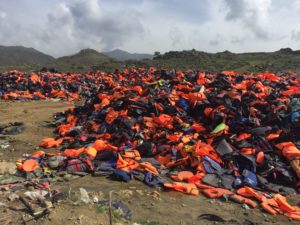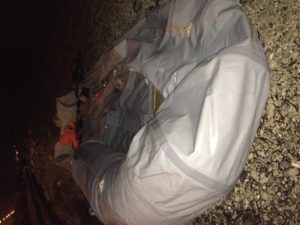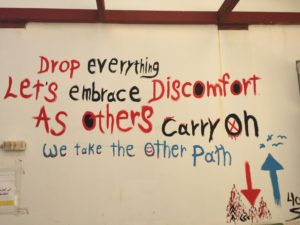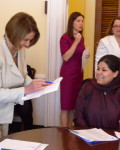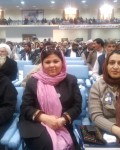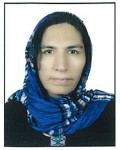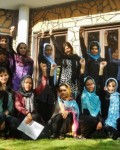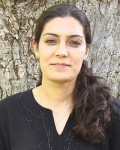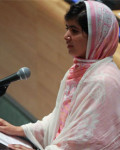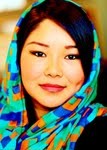By Zuhra Abhar
In February 2016, I traveled from Washington DC where I went to Lesvos, Greece, spending three weeks as a volunteer interpreting Dari and Pashto spoken by Afghan people in a refugee camp called Moria, and helping them with basic needs.
I heard both traumatic and inspiring stories during my time in the camp. Refugees showed how much they appreciate the ordinary residents of the Greek Islands, who open up their hearts and homes to save hundreds and thousands fleeing war and terror. Refugee families tried to help each other and they shared what they had, showing solidarity even in the midst of a harrowing survival situation. I was assigned to help in the distributing tent, and I provided dry clothes for the refugees who had just arrived in wet clothes from their sea-journey.
Many of them had lost all their valuables during the dangerous trip across the sea in small flimsy boats. A mother with three small children, ages five months, two and four years old, came to me and asked for dry clothes. I gave her a few shorts, pants and socks. After ten minutes she came back to me and she said, “Thank you for your help-I would like to return some of the clothes. As I only need one of each, I am sure other children need clothes, too”. I couldn’t stop my tears, seeing the generosity of a mother who not only cared about her children, but cared for other children as well. That mother taught us a lesson-it is okay to have less if it means sharing; even as she was struggling to survive the loss of her homeland and facing an uncertain future.
I met so many families who were in deep financial trouble. By the time they got to Turkey, most did not have money. I met a young single mother with her three-year-old son at the shoes tent. When I saw her, she wasn’t feeling well-I had a chance to sit down with her and asked her if she needed to see a doctor. She started crying and I tried to make her feel comfortable with me. When I felt she had come to trust me, I asked her, why are you crying, what happened? She told me that because she didn’t have money to cross the border, smugglers held her in Turkey for 26 days-and she was tortured and raped. Somehow she managed to escape and crossed the border. Like her, there are many single women who have suffered the same horrendous situation. Her story still haunts me.
Greece is a passageway to mainland Europe for the steady stream of refugees fleeing from Afghanistan, Iraq and Syria in search of peace, safety and a new life. Here, refugees are granted a 30-day visiting pass, which allows them to travel legally throughout Greece. Volunteers who greet them on the shores of Lesvos play a key role in creating a safe and comfortable environment for these exhausted refugees. Upon my arrival, I helped provide refugees with medical attention, clean and dry clothes and a hot meal. I also facilitated communication between the refugees and the governing officials who oversaw the registration processing. I made sure I created a climate in which the refugees felt welcome and valued.
Refugee families undergo a whole gamut of emotions during their journey: the tension and physical exhaustion of the journey, fear of the unknown, sadness for what they left behind, homesickness and hopelessness. And yet they also have excitement and some hope. Most refugees are completely unprepared for the journey, both physically and emotionally. The Sad part is, many refugees do not even make it to Greece but perish along the way. The boats are terrifyingly flimsy, not made for an ocean passage and are crowded beyond capacity. Many capsize and end in tragic drownings.
Refugees know little about what they need to do to survive and often travel with nothing except the clothes on their backs. My family and I came to the United States as refugees from Afghanistan not too many years ago. My time at the Moria camp brought back many troubling memories of the refugee camp in Pakistan. I understand what it means to be a refugee. Many new arrivals face so many challenges: not speaking other languages than their own, lack of money and resources; hopelessness and fear that they will not find safe haven (the borders have been closing all through Europe). They also suffer exhaustion, previous medical conditions or those inflicted by the rigors of their harrowing journey.
I had to put myself in their place, make them feel comfortable and gain their trust. I realized that they wanted someone to listen to their stories and the facts of their journeys. I felt connected with them, and shared my feelings and my own experience of being a refugee.
I told them: I think you are very brave. We-my family and I-were in your situation not too long ago. And we were able to reach safety and make a new life for ourselves. I am sorry for all that you have had to leave behind: your own home, possessions, a good job, friends and family. I hope you are able to start a life where you feel you belong-and where you can make a good, safe life for yourselves and your family. There are people here who really care about you, and think about your situation every day. There are people advocating for you, working hard to ensure that you are listened to, respected and supported. Things will be better—InshAllah.
This refugee crisis is a global issue which impacts all of us. As a world community we need to be more active in advocating for these refugees. This was my attempt to give comfort and support to human beings fleeing war and terror, just as my family did, such a relatively short time ago.

